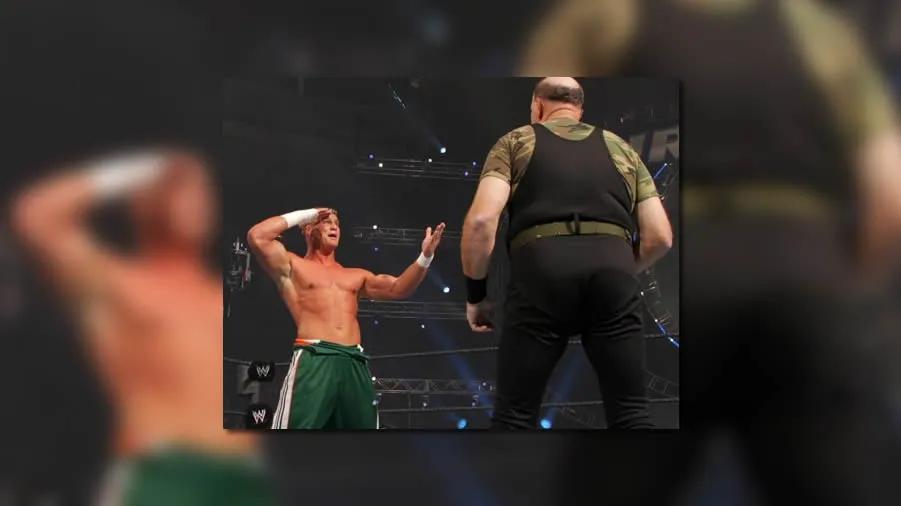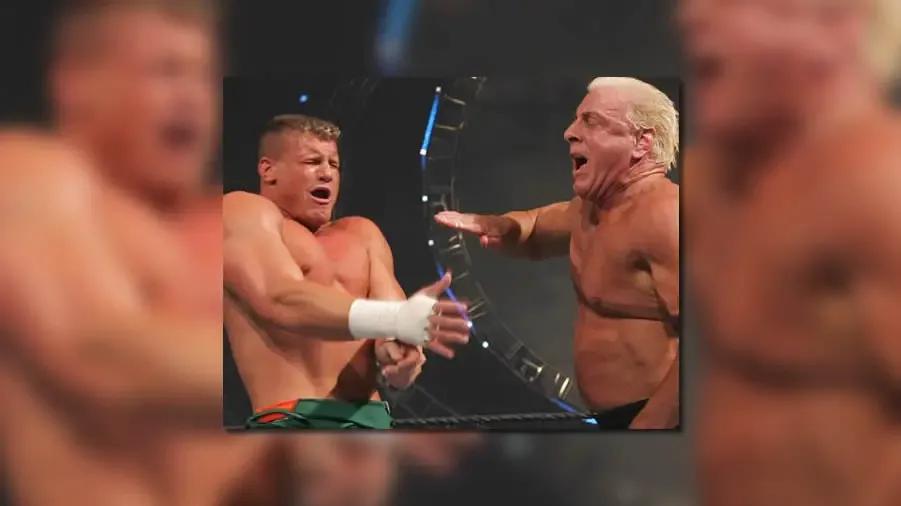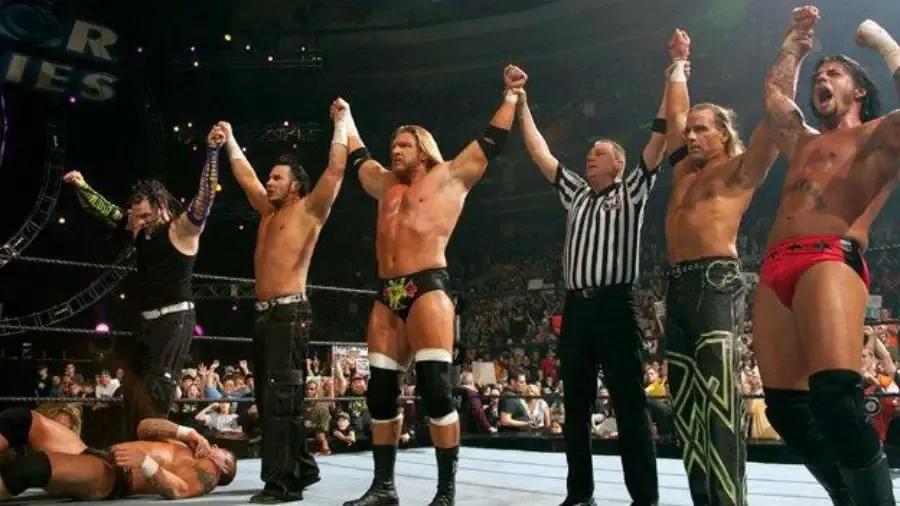10 Things We Learned From WWE Survivor Series 2006
The one where Team DX cleared house...

Nov 14, 2018
The intense dislike among brands had long since faded from the previous year's event, and even the ECW-WWE turf war had petered out into nothingness in the weeks following One Night Stand. The 2006 Survivor Series was less a show with high stakes (despite there being three title matches) than it was a placeholder event that satisfied the annual urge to see some teams battle attrition-style for no reason other than pride.
Where the 2006 event particularly stands out is in the diversity of the roster. The card had kind of an All-Star feel, as modern-era studs like John Cena, Randy Orton, CM Punk, and Bobby Lashley would share the stage with Attitude-era stalwarts like DX, Edge, Big Show, and The Hardyz, throwback icons like Ric Flair, Dusty Rhodes, and Sgt. Slaughter, as well as an ECW contingent of Sabu and Rob Van Dam. That's like a video game roster with all of the legends unlocked.
The 2006 Survivor Series is one of those quaint little shows that doesn't earn raves for having enthralling action and iconic matches, but is instead a simpler, more innocent time-killer that gives you a few smiles and keeps you invested. Basically, it's the 1989 Survivor Series with an unfathomable roster that defies time.

The City of Brotherly Love - the home of the (as of this writing) current, reigning, and defending Super Bowl Champion Philadelphia Eagles. You can call it self-indulgent for this author to brag about Philly's Super Bowl win (and it is), but America's fourth biggest media market gets a special shout-out here, so yes, I'll take advantage of any chance to go all E-A-G-L-E-S, albeit good-naturedly so.
Philadelphia was the location of the 2006 Survivor Series, and on that night, became the second city to host each of the Big Five pay-per-views. In order, they hit SummerSlam in 1990, King of the Ring in 1995 (ugh), WrestleMania in 1999, and the Royal Rumble in 2004. The only other city to manage this feat was Boston, who completed the puzzle by hosting SummerSlam just three months earlier in 2006. But don't let that distract you from the fact that Tom Brady fumbled with two minutes and change left.

Events like the 2009 and 2016 Survivor Series have a special place in my heart, simply for putting a major emphasis on elimination matches, as opposed to the 2010 and 2011 shows that just throw out a token elimination bout in order to pay lip service to the gimmick. The 2006 show, like the 2009 and 2016 examples, featured three elimination matches in and of itself.
The 2006 event marked the first time in seven years that a Survivor Series had at least three elimination bouts. It was a welcome and refreshing resurgence for a pay-per-view that had largely been taken for granted for a long time, treated like the lesser member of the Big Four. The fact that four shows since (2008, 2009, 2016, and the upcoming 2018 show) have gone that route makes me happy.

The opening match would see a legends contingent, captained by Ric Flair. His partners included Dusty Rhodes, Sgt. Slaughter, and Ron Simmons, who ended up being a hasty substitution for Rowdy Roddy Piper. Substitutions at Survivor Series have long been an accepted tradition, though Piper's removal from the match was for very serious reasons.
Piper ended up hospitalized with Hodgkin's lymphoma. A mass had to be removed from his back, prior to The Hot Rod undergoing radiation therapy. Astonishingly, wrestling actually helped him catch his condition early, as the rigours of returning to the ring for the brief nostalgia run allowed him to notice the mass. Piper noted that had he not been voted into a match at Cyber Sunday earlier that month, he may not have been diagnosed in time.

Prior to going with Ron Simmons (in the early days of his humorous "The Man Who Only Says Damn" run) as Piper's fill-in, WWE had another name in mind, considering another old Flair rival in Ricky "The Dragon" Steamboat. Steamboat had not wrestled in 12 years, but given how fantastic he looked in his brief 2009 WrestleMania/Backlash run, he clearly still had it.
However, WWE hit an unusual snag - Steamboat didn't own the rights to his ring name. As part of his divorce settlement with ex-wife Bonnie, she acquired the rights to his wrestling persona. WWE apparently tried to negotiate temporary use of the name for Survivor Series and the surrounding TV shows, but Bonnie refused. Thankfully, she was willing to eventually play ball when it came time for Steamboat's Hall of Fame induction and associated matches.

Coming back from down three-on-one to eliminate the remnants of The Spirit Squad probably isn't making Ric Flair's top career achievements, but it was still a crowd-pleasing way to end a jaunty opening match. Flair was no stranger to prior success at Survivor Series, having survived the opening match of the 1991 event as well.
The 2006 win gave Flair the record for longest time between any two survivals at the event, 15 years. Only two other men have had a decade-long gap between survivals at the event - Bubba Ray Dudley (13 years between 2002's table elimination match and the pre-show of 2015) and Triple H (2007 and 2017). Other notable "gappers" include Randy Orton (eight years between 2008 and 2016), Sheamus (seven between 2009 and 2016), and Big Show (six between 2004 and 2010).
Lita's loss to Mickie James at Survivor Series sealed the end of her full-time career as a wrestler, and she wasn't exactly given a dignified on-screen exit. Cryme Tyme arrived after the match to auction off some of her, uh, personal effects in another one of those deals that WWE wouldn't dream of doing today. Neither Lita, nor many of her fans, were pleased with how the future Hall of Famer was sent off.
But after the show, she was treated to something much nicer. Edge took her to what she assumed was going to be dinner with her folks (who flew in for the match), only to be taken to a bowling alley, where Edge had arranged for a going-away party with many of her friends. She was even shown a video of various people wishing her the best, including (to Lita's delight) Pee-Wee Herman.

It can be annoying sometimes when WWE announcers misstate facts, or twist something to fit a modern narrative. When Team DX pulled off a clean sweep against Edge and Randy Orton's fivesome, Jim Ross and Jerry Lawler were acting as though it was the first time in Survivor Series history that an entire team survived. In truth, it was the *sixth* time that a whole group remained in tact at match's end. In fact, Lawler was on one of those teams (1994).
What *is* true is that it was the first *five*-man team to completely survive an elimination match. Each prior example, starting with The Visionaries in 1990, was a quartet. To this day, Shawn Michaels, Triple H, The Hardy Boyz, and CM Punk remain the only five-person team to all survive.

One of the more comical eliminations came in that Team DX vs. Team Rated RKO 10-man, when Mike Knox fell victim to a distraction at the onset and Shawn Michaels Superkicked him into oblivion. But it wasn't enough to just pin the poor midcard fellow - Michaels acted as though he had no idea who Knox was, and had to openly confirm with his teammates that Knox, in fact, a valid participant in the match.
Allegedly, according to Figure 4 Weekly, this was based on a real-life incident in which Michaels had sat in a recent creative meeting. Knox's name came up and Michaels (who apparently didn't watch ECW) asked who that was. And that led to the elimination that everybody found funny (except for Knox, I'd assume).

Two months into his year-long WWE Championship reign, John Cena competed in the final elimination match of the evening, partnering up with Bobby Lashley to finish off Finlay and Big Show in order to survive. That brought Cena to victory at four consecutive Survivor Series events, with 2005 being his only participation in a non-elimination match to that point.
Cena became the fifth person in Survivor Series history (following Randy Savage, Ultimate Warrior, Hulk Hogan, and Randy Orton) to survive three times at the event. Amazingly, he became the first three-timer to survive in non-consecutive years. Each of the previous four had won out at concurrent events (Savage 1987-89, Warrior and Hogan 1988-90, Orton 2003-05), whereas Cena was 2003, 2004, and 2006. Took 20 Survivor Series events for that to happen.

I can tell ya first hand that leaving a Phillies or an Eagles game can be a gridlock nightmare, so Philly folks know firsthand that an early exit can be necessary. But the fans at Survivor Series probably weren't just thinking practically during the Batista/King Booker World Heavyweight title match - they were also following their hearts.
Reports came out that large droves of fans were leaving as the final match played out. It may not have been a mass exodus on a Roman Reigns vs. Samoa Joe in Newark level, but it was enough to create a tepid reaction in the match's final stages. Not that fans would've popped huge for Batista's big win anyhow, given how they were chanting for Booker early on.